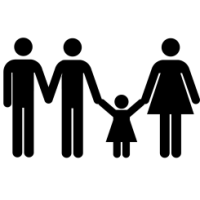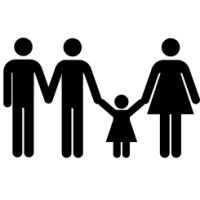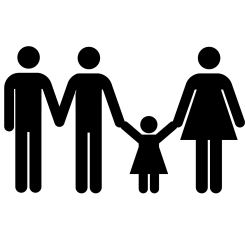Parentage Orders in New York have just become an easier option for lesbian families.
Parentage orders in New York are a reality after the passage of the Child Parent Security Act, a long-awaited statute that acknowledges how gay and lesbian couples and individuals have families and offers a direct course to legal parentage. As of February 15, 2021, New York has joined the legion of states that not only legalize gestational surrogacy, but also recognize how gay and lesbian couples and individuals have families and assist them in protecting those families with a direct pathway to parenthood.
Parentage Orders in New York are now a reality. Before February 15, 2021, the only clear way of establishing parentage in New York was through second or step-parent adoption. Many couples still choose to establish parentage through the adoption process because it is the gold standard of parentage. There is Supreme Court precedent for the recognition of adoption orders when the court refused to hear a case challenging the validity of an adoption order for a gay couple. There are still specific indications when adoption is preferred over a parentage order, however, if you are not a couple that travels Internationally or if you have no plans to move to a gay-unfriendly state, the New York statute will provide the protection your family deserves.
The process for a parentage order differs slightly between Counties, but there is some regularity that you can count on. First, the question of jurisdiction remains one that hinges on the cost of the process. If you choose to file in Supreme Court, you will receive an Order from that court that will most likely result without a court appearance. There are some costs associated with this method. When you file in Supreme Court, one of the procedural elements is the filing of a Request for Judicial Intervention (RJI), which comes with the cost of a $350.00 filing fee. When you file in Family Court, the case is heard by a Support Magistrate. There is no filing fee, however, there may be an appearance required.
If COVID-19 restrictions apply, appearances are virtual. This means that you will not have to go to court but log in to a virtual hearing online. COVID-19 will at some point in the future be an issue of the past. Families will have to weigh the costs of filing and the costs of appearing in court.
The specifics of filing will include a Petition, which collects the necessary information the court needs to process the request. The court also wants to hear from either the clinic that facilitated the pregnancy, the anonymous provider of sperm or the petitioners if they used home insemination to get pregnant. The Court wants to make sure that all Parties who should be notified of the proceeding are accounted for. The Petition verifies that the petitioning couple has lived in the State of New York for the last six months, that they consented to the Assisted Reproduction, the proposed name of the child and when the child is due to be born, or when they were born.
For couples who have their families with the assistance of an anonymous sperm donor, the court will require a letter from the sperm provider to affirm that the donor was indeed anonymous and has no legal parentage rights to the child. For couples who work with a known, or directed, donor, the court will view a Known Donor Agreement as proof that the donor does not intend to be a parent. If there is no Agreement in place, your Attorney will have to draft an Affidavit that the Donor would sign to affirm their intentions to the court. The Support Magistrate hearing the case may also request that your donor appear at your hearing.
The fact that we now have Parentage Orders in New York is a huge step forward for LGBTQ families. While some couples will still choose to create legal parentage through second or stepparent adoption, we have another, lower cost option. Parentage Orders in New York are a simple, straightforward way to affirm a family’s legal status and are available in many States across the Country. Thanks to The Child Parent Security Act, our families are more secure and the Courts are learning more about how we have our families and protect them from challenge.
By Anthony M. Brown, June 1, 2021. www.TimeForFamilies.com
The post Parentage Orders New York appeared first on Time For Families.
Source: Time for Families















